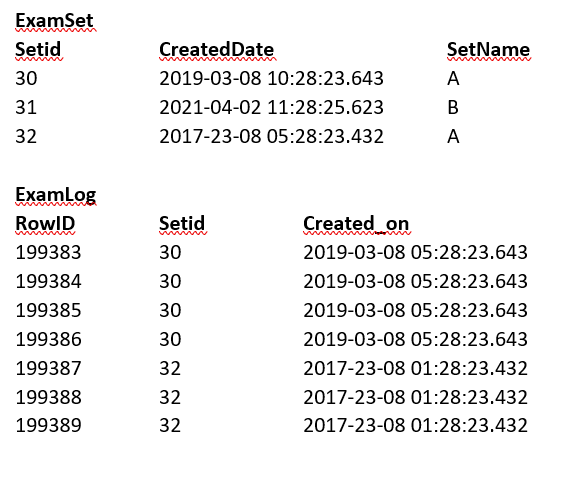Based on your new requirements
CREATE PROCEDURE sp_deleteLog(@day Int)
AS
BEGIN
DELETE FROM [dbo].[ExamLog]
WHERE Setid IN (SELECT SetId FROM [dbo].[ExamSet] Where CreatedDate<DATEADD(dd, -@day, GETDATE()));
END
This browser is no longer supported.
Upgrade to Microsoft Edge to take advantage of the latest features, security updates, and technical support.
Hello Everyone,
I have below query to delete record from 'ExamSet'. but based on the 'ExamSet' table 'Setid' column value i need to remove all reacords in 'ExamLog' table. here i need to select old Setids from ExamSet table CreatedDate (older records based on @Day parameter)
I need to delete all records (associated to Setid coming from ExamSet table) from ExamLog table only not from ExamSet table
CREATE PROCEDURE sp_deleteLog(@day Int)
AS
BEGIN
DELETE [dbo].[ExamSet] Where CreatedDate<DATEADD(dd, -@day, GETDATE());
END

Please help me
Thanks
Based on your new requirements
CREATE PROCEDURE sp_deleteLog(@day Int)
AS
BEGIN
DELETE FROM [dbo].[ExamLog]
WHERE Setid IN (SELECT SetId FROM [dbo].[ExamSet] Where CreatedDate<DATEADD(dd, -@day, GETDATE()));
END
What you describe is called "cascade delete".
See:
https://www.mssqltips.com/sqlservertip/2743/using-delete-cascade-option-for-foreign-keys/
Hi @krishna ramisetty
What you need is 'On Delete Cascade'
Please check this code and have a test:
use tempdb
go
create table ExamSet
(
Setid int primary key ,
CreatedDate datetime,
SetName varchar(10)
)
create table Examlog
(
RowID bigint primary key,
Setid int ,
Created_on datetime
)
insert into ExamSet values (30,'2019-03-08','A'),(31,'2021-04-02','B'),(32,'2017-08-23','A')
insert into Examlog values (199383,30,'2019-03-08'),(199384,30,'2019-03-08'),(199385,30,'2019-03-08'),(199386,30,'2019-03-08')
,(199387,32,'2017-08-23'),(199388,32,'2017-08-23'),(199389,32,'2017-08-23')
SELECT * from ExamSet;
SELECT * from Examlog;
alter table Examlog
add constraint FK_Examlog_Setid_delete
foreign key(Setid) references ExamSet(Setid)
on delete cascade
DELETE ExamSet Where CreatedDate<DATEADD(year,-4, GETDATE());
SELECT * from ExamSet;
SELECT * from Examlog;
Best regards,
LiHong
If the answer is the right solution, please click "Accept Answer" and kindly upvote it. If you have extra questions about this answer, please click "Comment".
Note: Please follow the steps in our Documentation to enable e-mail notifications if you want to receive the related email notification for this thread.